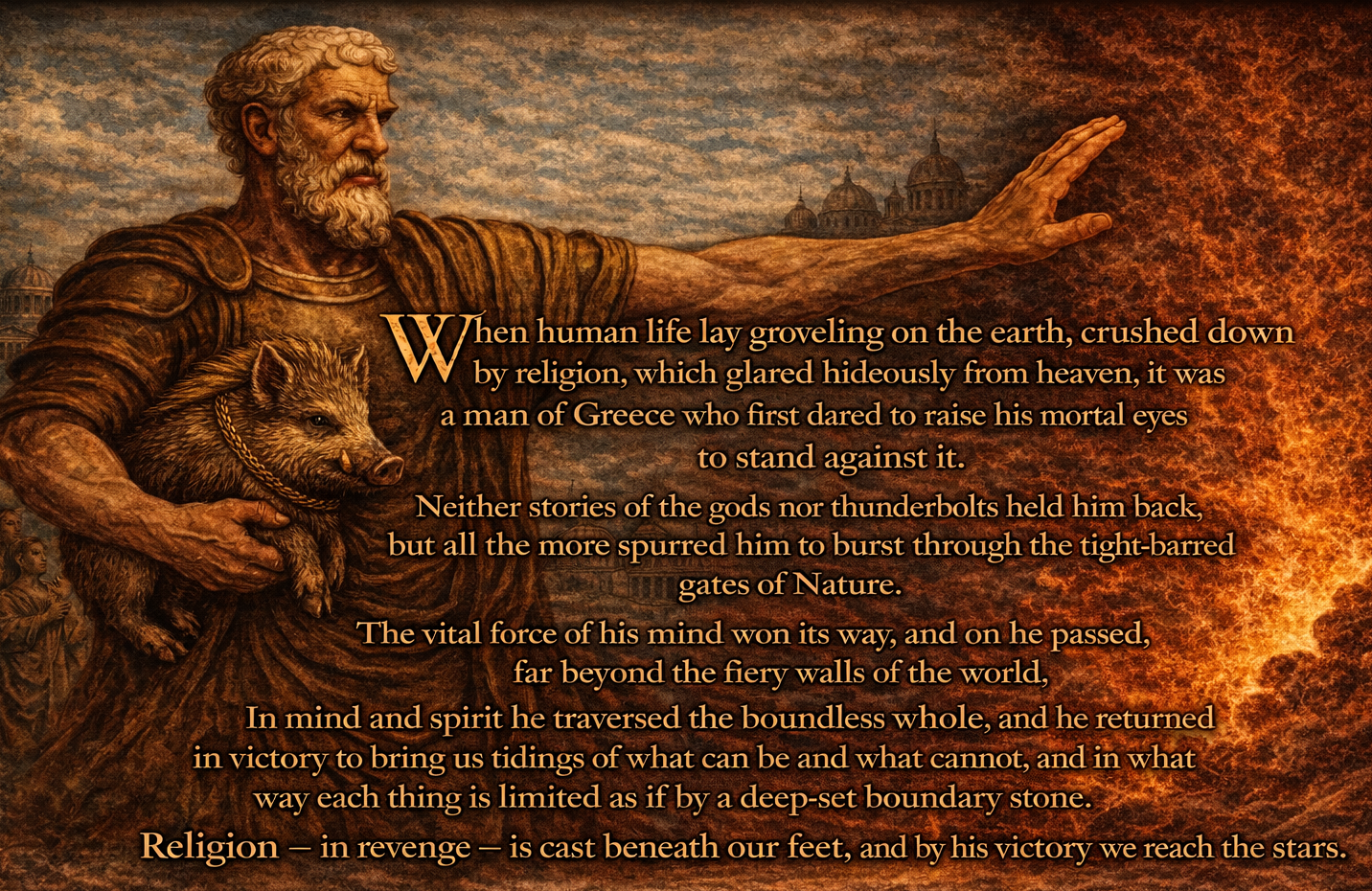There are as many opinions about happiness as there are people. Everyone has their own idea of what happiness is or should be. Some say that we should look to religion for happiness. Others say that
…
Read More
LATEST LUCRETIUS TODAY PODCAST: Episode 318 - "In the End It Is Pleasure - Not Virtue - Which Gives Meaning To A Happy Life" | Website Overview | Forum Navigation Map

EpicureanFriends.com is an internet community dedicted to Classical Epicurean Philosophy, where Happiness understood as a life of Pleasure is the goal, not "Ataraxia," "Tranquility," "Virtue," "Piety," "Minimalism," "Asceticism," or any other "Ism." But just like those other words, the word "Pleasure" bears close consideration, and that's a large part of what we discuss here while we focus on what Epicurus actually taught.
Epicurus taught a complete system that constitutes a revolutionary paradigm as to the nature of the universe, the nature of thought and truth, and the nature of the best life. Classical Epicurean Philosophy rejects many conventional assumptions that prevail as to "happiness," "pleasure," "gods," "virtue," and even "good and evil."
How does Epicurus challenge the prevailing wisdom? According to Epicurus, "happiness" is not a meaningless abstraction, but means specifically a life in which pleasure predominates over pain. "Gods" do exist, but gods are not supernatural, omniscient, omnipresent, or omnipotent. "Pleasure" is focus of happiness and the goal of life, but pleasure is not limited to sensory stimulation alone. "Virtue" is important in order to live happily, but virtue is not an end it itself. "Good" and "Evil" are not abstract absolutes, but evaluations based on pleasure and pain felt by real living beings. "Practical Reason" is essential for successful living, but "dialectical logic" is mere wordplay and useless for determining truth.
It is the goal of EpicureanFriends to explore the ideas of Epicurus and explain them to the modern world. For further introduction to Epicurean terminology, see our video "The Epicurean Paradigm Shift," and consult our wiki and our FAQ page. These same issues are discussed in Episode 222 of our Lucretius Today Podcast.
The heart of EpicureanFriends is our Forum, where those who are sincere about the study of Epicurus can interact in a sympathetic and supportive environment.
Physics + Canonics ⟶ Ethics
Core Texts: Diogenes Laertius | Lucretius | Torquatus | Velleius | Topical Outline
![]()
![]()
Read More
Read More
Read More
Read More
Read More
Read More
Read More
Read More
An introduction to the core principles of Epicurean philosophy, exploring the ancient wisdom of Epicurus and its relevance to modern life.
Cicero's "Torquatus" explains and defends Epicurean philosophy.
Cicero's "Velleius" argues against supernatural gods and explains Epicurus' views of true divinity.
Essential concepts to understand when reading Epicurus for the first time. Learn about the paradigm shift in thinking that Epicurean philosophy represents.
Lucretius Today interviews Dr. Emily Austin to discuss her recent book, which is one of the best introductions to Epicurus available anywhere.
Lucretius Today interviews Dr. Marcelo Boeri, co-author of a book on practical applications of Epicurean political theory.
Lucretius Today interviews Dr. David Glidden author of the article "Epicurean Prolepsis."
![]()
![]()
![]()
![]()
![]()
![]()
![]()
![]()
![]()
![]()
![]()
![]()
![]()
![]()
![]()
![]()
![]()
![]()
![]()
![]()
![]()
![]()
![]()
![]()
![]()

 1
1

 1
1

 3
3

1. Familiarize Yourself with the Fundamentals
|
2. Read Our ForumIt is not necessary to have an account in order to read our forums. We recommend everyone browse the forums before requesting an account. |
3. Read Our Collection of Core Epicurean Texts |
4. Listen to the Lucretius Today Podcast
|
5. Check Out Our Wiki and FAQ Pages |
6. View Our Gallery and Videos |
7. Check Out Our Special Resources |
8. Read Our Recommended Books |
9. Get More Involved by Registering for an AccountFor those who are sincerely interested in the study of Epicurus and pursuing Classical Epicurean Philosophy ...and who wish to collaborate with the EpicureanFriends community, we welcome you to register an account. Upon registration you will be given “Introductory Member” basic level access. Before you register, please be sure to read our foundational documents: |
10. Try Our Member Activities (requires account registration) |

